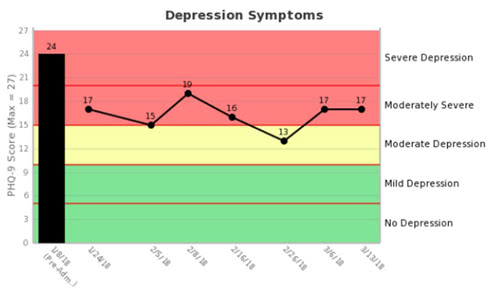Dr. Ingrid Carlier’s 2012 meta-analysis of 45 mental health-related clinical trials showed that addiction progress monitoring helped patients get better faster in 65% of the trials, including all three of the addiction treatment studies. Simply put, progress monitoring – tracking how patients are feeling throughout treatment and reporting it to their clinicians in an easy-to-understand way – works.
During the course of monitoring more than 40,000 patients during treatment, we’ve learned that progress monitoring helps patients get better faster for at least four different reasons:
- Treating Co-Occurring Disorders: Since people struggling with addiction are often self-medicating with drugs or alcohol to cover up symptoms of depression, anxiety, trauma, psychosis or other mental disorders, appropriate treatment of co-occurring disorders is integral to recovery.
Because Vista is screening patients at intake for a variety of common co-occurring disorders and reporting the results instantly in an easy-to-understand manner, clinicians are able to start treating these underlying conditions immediately. A Vista client treating patients in multiple states estimated that the intake screening identified patients with previously-undiagnosed co-occurring disorders in 30% to 40% of their patients.
- Identify Patients Who Are Not Progressing As Expected: Clinicians who are meeting regularly with a patient will tend to assume that the patient is improving steadily over time. Vista’s graphs make it crystal clear when this is not happening so that a change in treatment plan can be considered:

- Flag Patients at Higher Risk of Leaving Against Medical Advice: Preliminary research has shown that about 80% of the addiction treatment patients who leave treatment AMA indicate their disengagement from treatment by either:
- Vista is in the midst of a comprehensive predictive modeling project that we expect will allow us to alert clinicians to patients at higher risk of leaving AMA in the software shortly.
- Submitting substantially fewer update surveys than similar patients at that center
- Making few or predominantly negative responses to the open-ended questions on Vista’s update surveys
- Continually Improve Treatment: Managers can use Vista’s data analytics platform to analyze 40 different patient-reported metrics by clinician, by program and by time period to identify opportunities to improve treatment. Additionally, Vista provides a 5-week online Performance Improvement Workshop each January to assist clients in using their data to set strategic goals and action plans for the year.
